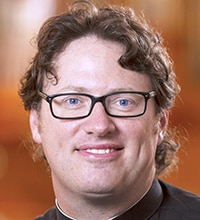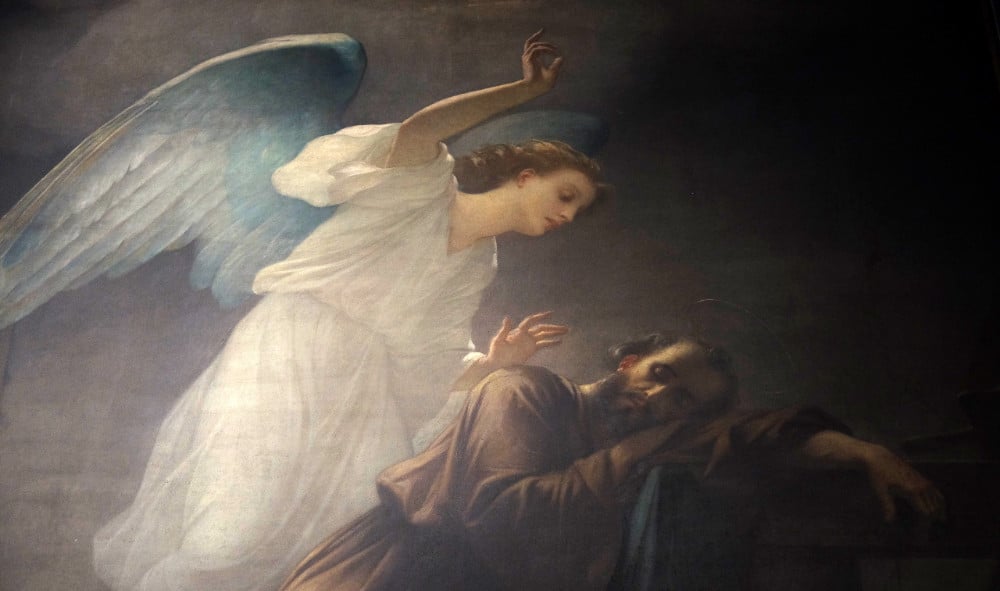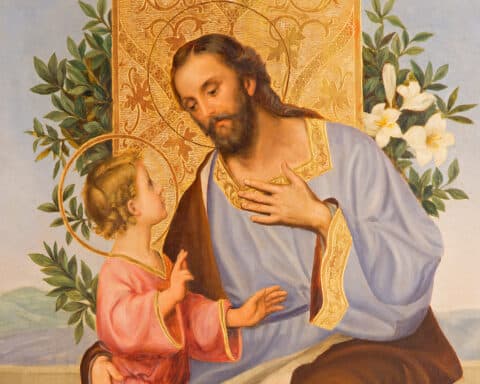
That, at least, is what the angels teach me in this story: the consolation of St. Joseph, it’s called. It teaches me that to receive Christ properly, we must be open to the angelic, to the divine. There is no such thing as a secular Christmas.
In his Gospel, Matthew, in genealogical detail, puts forward an essential Messianic claim about Jesus, that he is the promised son of Abraham and David (cf. Mt. 1:1-17). “I will make of you a great nation,” God told Abram (Gn 12:2). “I will establish his royal throne forever,” God said of David (2 Sm 7:13). In Jesus of Nazareth, those promises are fulfilled; that’s Matthew’s first argument.
| December 18 – Fourth Sunday of Advent |
|---|
|
Is 7:10-14 |
But there’s more. And this is the point of this Sunday’s passage from Matthew. This promised child is the child of God: “it is through the Holy Spirit that this child has been conceived in her” (Mt 1:20). Not just fulfillment, incarnation: that’s what’s more. That’s why angels were pressed into service, because this truth — the truth of Christmas — is an act purely of God’s own doing; only God could have told us about it. Joseph couldn’t have discerned this on his own. He needed help — angelic help, unworldly light.
Which invites us to open ourselves to the angelic and divine. The thing about Christmas, packed with its customs and routines, is that it can become a season so rote that we miss the mystery of it entirely. We all know the tired cliche this time of year about the freneticism of the season, but the cliche is true. Often, what steals Christmas from us is the season itself — its parties and presents, the planning of it all. Which is why we must find time somehow, some way to open ourselves to God and the truth only he can whisper, which only he can show us. Maybe we should take a nap as Joseph did; at least, we should steal away some time for prayer. Otherwise, our Christmas may just be what we make of it — a holiday perhaps filled with some measure of shallow cheer but not as jolly or bright as it should be — not angelic, not eternal at all.
What I’m talking about, I guess, is the real Christmas. It’s a Christmas only God can give; it’s something angels announce, not advertisers. It’s a Christmas that must be approached spiritually through prayer, the reading of the Scripture and making a good confession. And it’s also a Christmas that brings people together, wrapping us together in justice and kindness. Once he woke up, Joseph welcomed Mary into his home. The real Christmas makes us charitable, hospitable — like Mary welcoming Christ, Joseph welcoming Mary, and each of us welcoming both neighbor and God. That, too, is a mark of real grace, that it makes us gracious — the first spiritual fruit of Christmas, good cheer to everyone.
Father Joshua J. Whitfield is pastor of St. Rita Catholic Community in Dallas and author of “The Crisis of Bad Preaching” (Ave Maria Press, $17.95) and other books.





